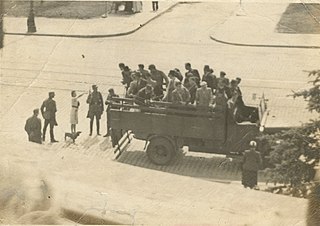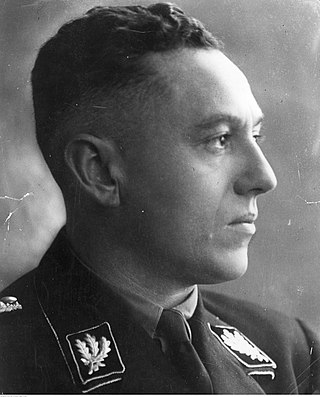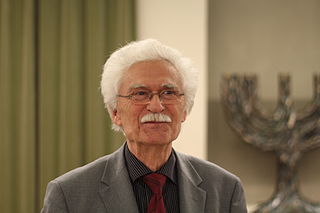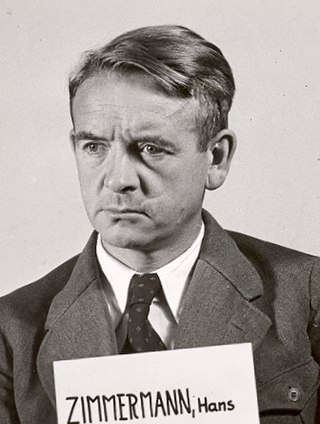
Gdańsk is a city on the Baltic coast of northern Poland, and the capital of the Pomeranian Voivodeship. With a population of 486,492, it is Poland's sixth-largest city and principal seaport. Gdańsk lies at the mouth of the Motława River and is situated at the southern edge of Gdańsk Bay, close to the city of Gdynia and the resort town of Sopot; these form a metropolitan area called the Tricity (Trójmiasto), with a population of approximately 1.5 million.

Bloody Sunday was a sequence of violent events that took place in Bydgoszcz, a Polish city with a sizable German minority, between 3 and 4 September 1939, during the German invasion of Poland.

Sopot is a seaside resort city in Pomerelia on the southern coast of the Baltic Sea in northern Poland, with a population of approximately 40,000. It is located in Pomerania Province and has the status of county – the smallest city in Poland to have that status. Sopot lies between the larger cities of Gdańsk to the southeast and Gdynia to the northwest. The three cities together form the Tricity metropolitan area.

The Free City of Danzig was a city-state under the protection and oversight of the League of Nations between 1920 and 1939, consisting of the Baltic Sea port of Danzig and nearly 200 other small localities in the surrounding areas. The polity was created on 15 November 1920 in accordance with the terms of Article 100 of the 1919 Treaty of Versailles after the end of World War I.
Nazi songs are songs and marches created by the Nazi Party. In modern Germany, the public singing or performing of songs exclusively associated with the Nazi Party is now illegal.

Łapanka was the Polish name for a World War II practice in German-occupied Poland, whereby the German SS, Wehrmacht and Gestapo rounded up civilians on the streets of Polish cities. The civilians arrested were in most cases chosen at random from among passers-by or inhabitants of city quarters surrounded by German forces prior to the action.

Albert Maria Forster was a German Nazi Party politician, member of the SS and war criminal. During the Second World War, under his administration as the Gauleiter and Reichsstatthalter of Danzig-West Prussia, the local non-German populations of Poles and Jews were classified as sub-human and subjected to extermination campaigns involving ethnic cleansing, mass murder, and in the case of some Poles with German ancestry, forceful Germanisation. Forster was directly responsible for the extermination of non-Germans and was a strong supporter of Polish genocide, which he had advocated before the war. Forster was tried, convicted and hanged in Warsaw for his crimes, after Germany was defeated.
"Erika" is a German marching song. It is primarily associated with the German Army, especially that of Nazi Germany, although its text has no political content. It was created by Herms Niel and published in 1938, and soon came into usage by the Wehrmacht. It was frequently played during Nazi Party public events. According to British soldier, historian, and author Major General Michael Tillotson, it was the single most popular marching song of any country during the Second World War.

"Fast as a Shark" is a song by German heavy metal band Accept and a single from their 1982 album Restless and Wild.
KS Gedania Danzig was an ethnically-Polish association football club that was part of German football competition in the inter-war period. It was formed in 1922 in what was at the time the Free City of Danzig. Banned by the Nazis in 1939, the club re-emerged following the end of World War II and is active today as Gedania 1922 Gdańsk.

History of Pomerania between 1933 and 1945 covers the period of one decade of the long history of Pomerania, lasting from the Adolf Hitler's rise to power until the end of World War II in Europe. In 1933, the German Province of Pomerania like all of Germany came under control of the Nazi regime. During the following years, the Nazis led by Gauleiter Franz Schwede-Coburg manifested their power through the process known as Gleichschaltung and repressed their opponents. Meanwhile, the Pomeranian Voivodeship was part of the Second Polish Republic, led by Józef Piłsudski. With respect to Polish Pomerania, Nazi diplomacy – as part of their initial attempts to subordinate Poland into Anti-Comintern Pact – aimed at incorporation of the Free City of Danzig into the Third Reich and an extra-territorial transit route through Polish territory, which was rejected by the Polish government, that feared economic blackmail by Nazi Germany, and reduction to puppet status.

"Siekiera, motyka" is a famous Polish Resistance military and street-level protest song from the period of World War II. It became the most popular song of occupied Warsaw, and then, of the entire occupied Poland. The song was inspired by an old humorous folk-tune performed already in 1917 with different and constantly changing lyrics, adapted for the army in a 1938 publication under a different title.
Volkslied is a genre of popular songs in German which are traditionally sung. While many of them were first passed orally, several collections were published from the late 18th century. Later, some popular songs were also included in this classification.

Dieter Schenk is a German author, former high police officer of the Bundeskriminalamt, and a member of Amnesty International. He is best known for his work and activism which led the German court in Lübeck to overturn a 1939 verdict from World War II, regarding the defenders of the Polish Post Office in Danzig (Gdańsk), as well as his books on the widespread influence of ex-Nazis in post World War II Federal Criminal Police Office (BKA).
Józef Tusk was a Polish luthier, the grandfather of the Prime Minister of Poland, Donald Tusk. During World War II, he served in the Wehrmacht, which proved to be controversial during the 2005 Polish presidential election.
Film Polski was the state-run film production and distribution organization of Poland, founded in 1945.

Hans Zimmermann was a German Nazi Party official. He served as the Acting Gauleiter of Gau Franconia between February 1940 and April 1942.

Franz Kurowski was a German author of fiction and non-fiction who specialised in World War II topics. He is best known for producing apologist, revisionist and semi-fictional works on the history of the war, including the popular English-language series Panzer Aces and Infantry Aces.

Wolfram Wette is a German military historian and peace researcher. He is an author or editor of over 40 books on the history of Nazi Germany, including the seminal Germany and the Second World War series from the German Military History Research Office (MGFA).
Mark C. Yerger was an American author of books about the Schutzstaffel (SS) and Waffen-SS of Nazi Germany. He had close contacts to SS veterans, through whom he was able to access private archives, and wrote biographies of commanders and award recipients of the SS and of SS units. Historians of World War II have described Yerger's work as uncritical, hagiographic and whitewashing towards the SS.













